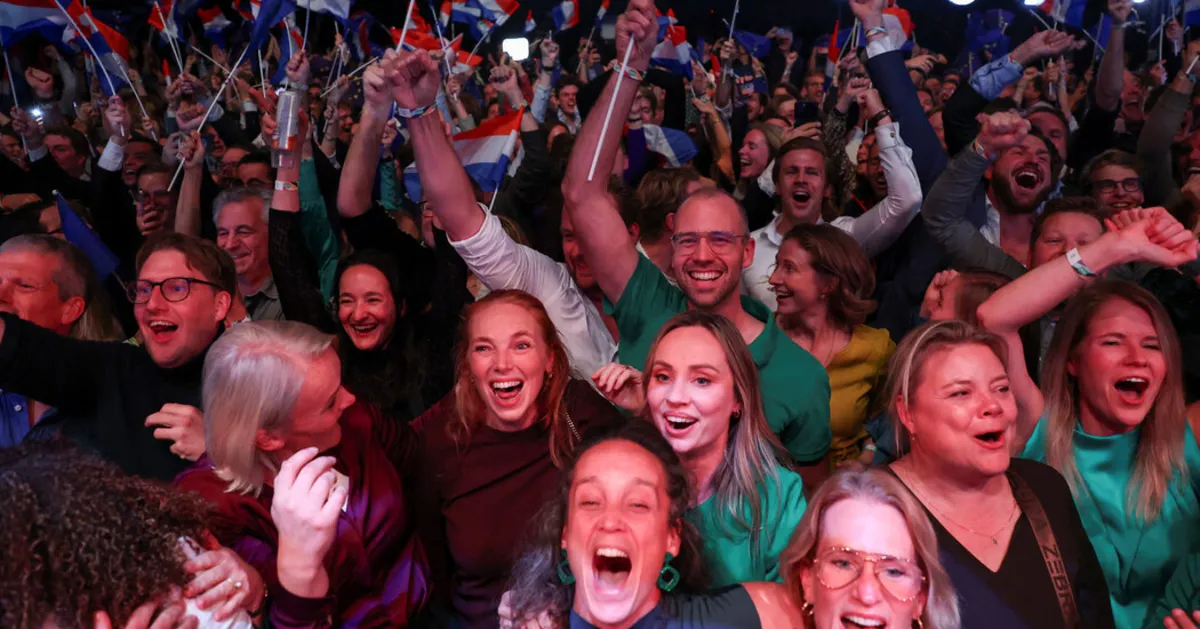
In a significant turn of events during the national elections held on Wednesday, a Dutch center-left party has emerged as the biggest winner, marking a decisive rebuke to the far-right party that had previously dominated the political landscape of the Netherlands. According to exit polls, the center-left party, Democrats 66 (D66), is projected to secure 27 seats in the 150-seat House of Representatives, making it the largest political force in the country. This outcome closely follows Geert Wilders’ far-right Party for Freedom (PVV), which is projected to win 25 seats, resulting in a loss of 12 seats for Mr. Wilders.
In response to the exit polls, Mr. Wilders expressed his disappointment on social media, stating, “The voter has spoken. We had hoped for a different result, but kept our backs straight. We are more combative than ever and still the second and maybe even the biggest party of the Netherlands.” With no party achieving an outright majority, the focus now shifts to the formation of a coalition government, a process that could potentially take several months.
The leader of D66, Rob Jetten, has emerged as a likely candidate for the next prime minister. Speaking to a jubilant crowd waving Dutch flags after the vote, Jetten declared, “We succeeded. Millions of Dutch people chose for positive forces and politics that looks ahead.” This election marks a historic moment for D66, as it could potentially become the country’s largest political party for the first time in its 59-year history, reflecting an increase of 18 seats in the House of Representatives.
The setback for Wilders’ far-right party comes amid a backdrop of increasingly polarized politics across Europe. Voters are finding themselves divided between contrasting political visions, often influenced by critical issues such as immigration, housing costs, and crime. These topics were at the forefront of the recent Dutch elections, with the housing market and health care being pivotal issues in the lead-up to the voting.
In the previous election held in 2023, Wilders’ party achieved a remarkable victory, claiming the largest share of the 150 House of Representatives seats, which drastically altered the Dutch political landscape and established Wilders as a significant force in politics. However, he was unable to secure the role of prime minister due to a lack of coalition support. In July, Wilders withdrew his party from the governing coalition, citing frustration over the stalling of his proposed stringent migration policies, which ultimately led to these early elections.
Post-election, Wilders asserted that he did not regret his earlier decision, despite the substantial losses his party faced. Political analysts suggest that voting for Wilders this time may have felt futile as other major party leaders had preemptively excluded him from coalition talks before the elections. According to Janka Stoker, a professor of leadership and organizational change at the University of Groningen, this exclusion could limit Wilders’ influence moving forward.
Political experts, including Simon Otjes, an assistant professor of Dutch politics at Leiden University, note that D66 has positioned itself as a bridge between the right and left. However, he cautions that the victory of a center-left party does not signify a definitive defeat of populism, as other far-right parties, like JA21 and Forum for Democracy, are poised to gain seats, potentially compensating for the losses faced by the PVV.
The Dutch political landscape remains fragmented, raising questions about the formation of a stable government. The results reveal a notable challenge for the left-wing bloc, comprising the Green and Labor parties, which is expected to lose five seats in the House of Representatives. Following the election results, Frans Timmermans resigned as the bloc’s leader, addressing supporters with a message of hope, stating, “Better times will come.” Meanwhile, volunteer Wobke van der Kolk remarked, “I think we expected more. The right has remained quite strong.”
As the dust settles on these elections, the Dutch electorate appears to be searching for stability amidst a backdrop of chaos, with centrist parties beginning to articulate their policies on immigration, paralleling trends seen throughout Europe. The implications of this election will undoubtedly shape the future of Dutch politics as parties navigate coalition negotiations and voter expectations.